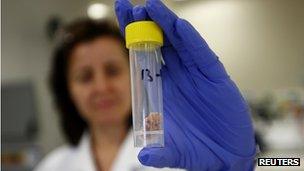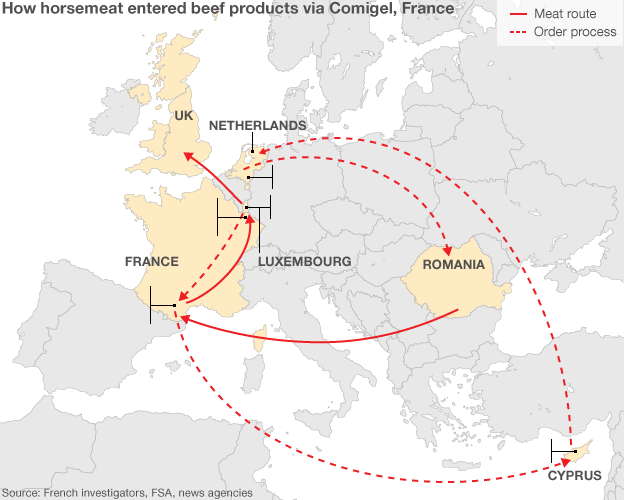Horsemeat scandal: EU launches immediate wider tests
- Published

Europe-wide tests should reveal the true scale of the horsemeat problem
EU member states plan to start testing immediately for horse DNA in processed beef foods and to detect an illegal medicinal drug in horsemeat.
The decision came at a meeting of the EU Standing Committee on the Food Chain, focused on the horsemeat scandal involving 12 European states.
Horse DNA has been found in numerous processed beef frozen meals.
Dutch officials have raided a meat processing plant suspected of mislabelling beef, prosecutors say.
The unnamed plant in the southern province of North Brabant is being checked as part of an investigation into an estimated 100 firms by the prosecutor's office and the government's food and consumer watchdog, the NVWA.
Norway and Austria are the latest two European countries to find horsemeat being sold as beef, discovering it in ready-to-eat meals.
Previously, the mislabelled meat was discovered in the UK, the Republic of Ireland, France, Switzerland, Sweden and Germany. Suspicious products have also been withdrawn in the Netherlands as tests are conducted there.
French supplier Spanghero has apologised to UK consumers over the horsemeat, but denied selling it deliberately.
Month of tests
The widening scandal has highlighted the complexity of the food industry's supply chains across Europe.
Under the EU plan announced on Friday, 2,250 processed beef samples will be tested across the EU, ranging from 10 to 150 per member state. The samples will come from foods on sale in retail outlets and marketed as containing beef.
Separately, tests will be conducted for possible residues in horsemeat of phenylbutazone, also known as "bute".
The testing regime will be one sample per 50 tonnes of horsemeat, and each country will carry out a minimum of five tests. Phenylbutazone is a veterinary medicine whose use in livestock, including horses, is illegal.
On Thursday the FSA said eight horses killed in the UK had tested positive for bute, and meat from six of them may have entered the food chain in France.
But England's chief medical officer said the highest level detected posed "very little risk to human health".
The EU test results will be fed into the 27-nation bloc's rapid alert system for food safety. The tests will be carried out over one month, but that may be extended for another two months.
EU Health Commissioner Tonio Borg welcomed the swift approval of the plan by EU member states.
"I call on them to keep up the pressure in their efforts to identify a clear picture and a sequence of events," he said in a statement.
"Consumers expect the EU, national authorities and all those involved in the food chain to give them all the reassurance needed as regards what they have on their plates."
'Innocent victims'
The French government has suspended Spanghero's licence, saying it "knowingly" sold horsemeat as beef.
"We are innocent, we are victims, but I want to tell British consumers we are really sorry, we never sold them horsemeat deliberately," Spanghero's sales director Christophe Giry told the BBC.
"The French government put us to death," he added. Veterinary inspectors are visiting Spanghero's premises in southern France.
In the UK three people were arrested for suspected fraud in meat sales on Thursday.
And on Friday catering giant Compass Group and Whitbread, one of Britain's largest hotel chains, said it had found horse DNA in products sold as beef.
Some of the affected burgers and lasagne had been supplied to pubs and schools in the UK and Ireland.
Meanwhile, the UK's Food Standards Agency (FSA) said that after 2,501 fresh tests no new products had been identified as containing more than 1% horsemeat. It said the 29 positive results were on seven previously withdrawn products.
'Conspiracy'
In France, ministers said they believed the sale of horsemeat labelled as beef went on for six months and involved about 750 tonnes of meat.
Spanghero imported meat from Romania and sold it on to another company, Comigel, which made frozen ready meals at its factory in Luxembourg for further distribution.
Millions of processed meat products have been withdrawn from supermarket shelves across the EU.
The UK has asked the European investigative agency Europol to co-ordinate a continent-wide investigation into an alleged international conspiracy to pass horsemeat off as beef.
 1. Comigel: Food processor
3. Spanghero: Meat processor
2. Tavola: Factory
4. Subcontractor
5. Trader
6. Abattoirs
7. Supermarkets
1. Comigel: Food processor
3. Spanghero: Meat processor
2. Tavola: Factory
4. Subcontractor
5. Trader
6. Abattoirs
7. Supermarkets
French food producer makes order
Comigel HQ in Metz, north-east France, asks its subsidiary, Tavola in Luxembourg, to make food products - including beef lasagne for Findus.
Factory orders meat
The Tavola factory orders the meat from Spanghero in the south of France.
Subcontractor used
Spanghero contacts a subcontractor in Cyprus to source the meat.
Subcontractor enlists trader
The Cypriot subcontractor in turn contacts a trader in the Netherlands.
Trader orders from Romania
The trader in the Netherlands places an order for meat with abattoirs in Romania.
Abattoirs send meat to France
The meat from the abattoirs travels to Spanghero in France. However, Romania rejects claims that it was responsible for wrongly describing the horsemeat from its abattoirs as beef. Horsemeat is always labelled as such, they say. The Romanian authorities claim records show orders had been for horse carcass - easily distinguishable from beef.
Meat used to make products
Spanghero sends the meat to the Comigel subsidiary’s factory in Luxembourg before the finished products are supplied to Findus and retailers across Europe, including the UK. The president of Comigel says the company was unaware the meat was coming from abroad.
Horsemeat found in Ireland and UK
Tests by Irish authorities have found equine DNA in beefburgers made by firms in the Irish Republic and the UK. Traces of horsemeat have also been found in stored meat at another plant in Ireland and one in Northern Ireland. In mainland Britain, police and officials probing alleged horsemeat mislabelling have carried out raids at a slaughterhouse in West Yorkshire and a meat firm near Aberystwyth. Three men were later arrested on suspicion of offences under the Fraud Act..